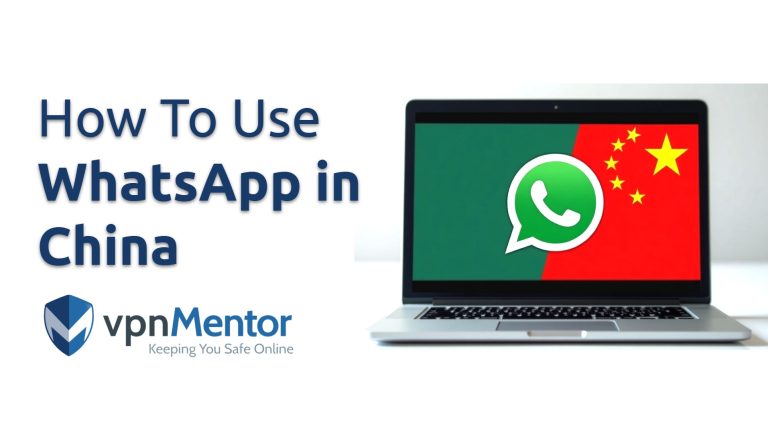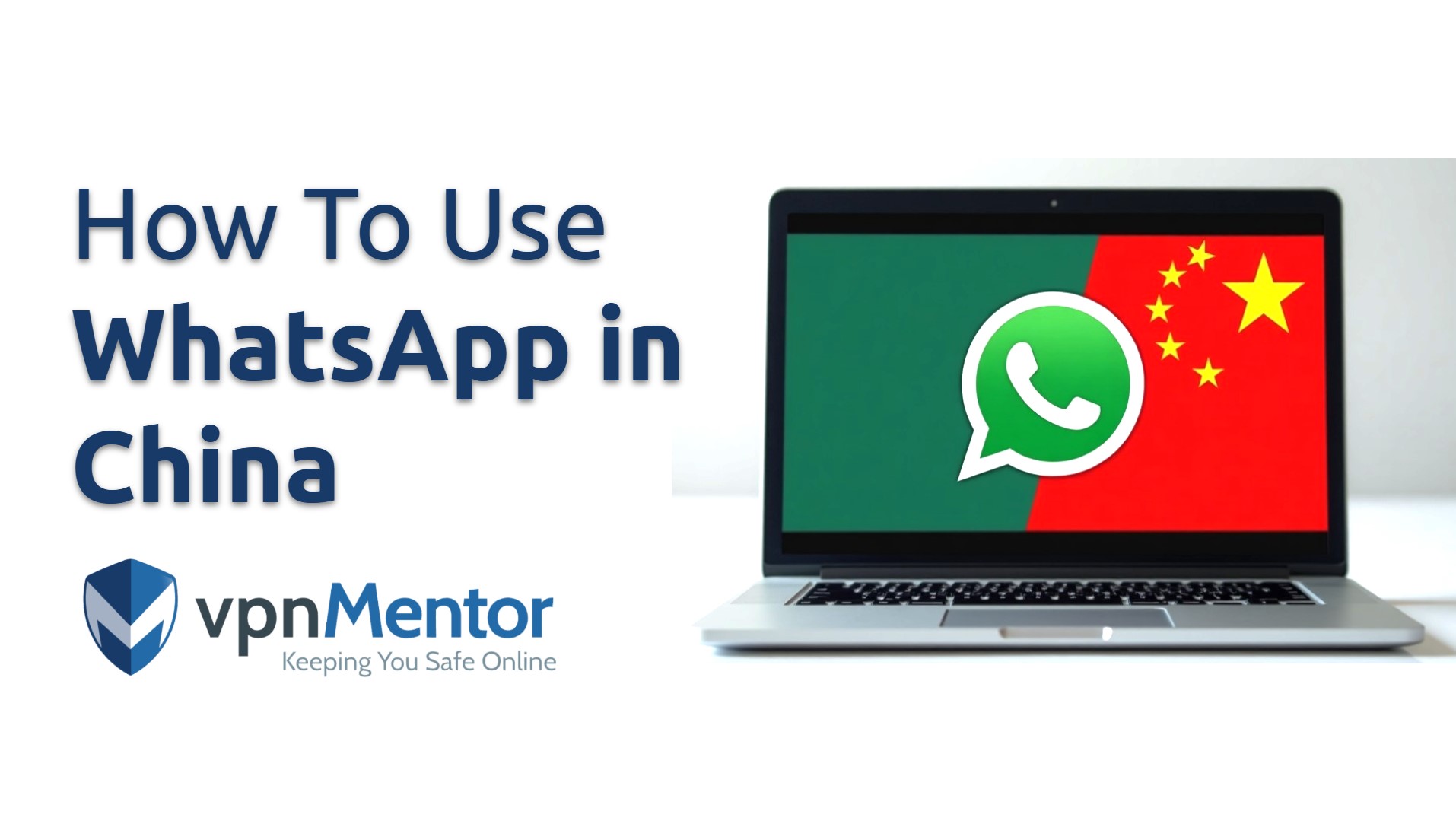How To Use WhatsApp in China on Any Device: Works in 2025
The Great Firewall of China blocks many apps and websites, including WhatsApp, because its contents can’t be easily monitored. The government restricts internet traffic using deep packet inspection (DPI) to filter out and block unwanted online activities.
How do I open WhatsApp in China? A reliable VPN with advanced obfuscation technology masks VPN traffic so that WhatsApp can be securely used in China. Reports show that millions in China use VPNs to access WhatsApp (Pymnts, 2024)1. A VPN also protects your privacy with advanced encryption, preventing communications surveillance.
Why Doesn't WhatsApp Work in China?
The Chinese government heavily restricts internet access through its Great Firewall system, which blocks many foreign websites and apps, including WhatsApp. According to Ifex (2021)2, China blocks 16% of the top 1000 domains on Alexa. This sophisticated censorship infrastructure prevents direct connections to WhatsApp's servers in several ways:
- Deep packet inspection analyzes internet traffic to identify and block WhatsApp's protocols.
- DNS poisoning redirects WhatsApp connection attempts to dead ends.
- IP address blocking prevents access to WhatsApp's server infrastructure.
- QoS filtering degrades connection quality to make the app unusable.
The restrictions are part of China's broader internet sovereignty policy, which promotes domestic alternatives like WeChat while maintaining strict control over online communications. This ensures that authorities can monitor and regulate all digital communications within China. This excessive restriction has led to over 21% of Chinese internet users relying on VPNs when browsing (Statista, 2024)3.
How To Use WhatsApp in China on iPhone and Android
How can I use WhatsApp on my phone in China? To safely access WhatsApp in China, use a VPN to reroute your internet traffic through a private server in a different country. This makes your online activities invisible to third parties, like ISPs, but only the best VPNs for China reliably work in the country.
The steps below provide an in-depth guide to using WhatsApp in China on Android, but the process is similar for iPhone — you'll just need to go to the Apple App Store to download the app.
1. Install a VPN
Download and set up a VPN ideally before arriving in China. Most VPN websites are blocked in China, making it difficult to download them once you're there.
2. Configure Your VPN Settings
Enable essential security features to prevent WhatsApp from being blocked. Make sure the VPN's obfuscation is enabled. This makes your VPN traffic appear like regular internet traffic to avoid getting blocked.
Also, turn on the kill switch to stop your data from leaking if the VPN disconnects.
3. Connect to a Server
Choose a server location close to China for better performance. Based on our testing, servers in Hong Kong, Japan, and Singapore provide the fastest speeds for WhatsApp calls and video chats. Connect to one of these locations before opening WhatsApp.
4. Launch WhatsApp
Once connected, you can safely download WhatsApp from your Play Store or App Store. Open the app and check that all features work correctly. You should now be able to send messages, make calls, and share media files.
If WhatsApp doesn't connect immediately, try switching to a different nearby server. The app might take slightly longer than usual to load due to the VPN connection.
5. Keep Your VPN Connected
Stay connected to your VPN whenever you use WhatsApp in China. If your VPN disconnects, WhatsApp will stop working.
Our Methodology for Testing VPNs for Using WhatsApp in China
We rigorously evaluated each VPN's ability to provide stable WhatsApp access. Key criteria included the effectiveness of stealth protocols, server proximity to China for optimal speeds, and the reliability of mirror sites for downloading VPNs. We also reviewed their security and privacy features to confirm that you'll remain anonymous online.
Why Isn’t WhatsApp Working When Connected to a VPN?
Even with a VPN connected, WhatsApp might not work in China due to several common issues that can prevent the app from functioning correctly. Here's what might be causing problems and how to fix them:
- Your VPN was detected. China's Great Firewall actively looks for and blocks VPN traffic. Regular server changes and enabling obfuscation features can help avoid detection.
- IP/DNS leaks. Your DNS requests might reveal your actual location despite using a VPN. Top VPNs include IP and DNS leak protection, but you may need to enable it in settings manually.
- Outdated WhatsApp version. China blocks access to WhatsApp's servers, making it difficult to update the app. Download the latest version before traveling to China.
- Connection timeouts. The Great Firewall can cause connection delays that trigger WhatsApp's security timeouts. For faster speeds, try connecting to servers in nearby countries like Hong Kong or Japan.
- App cache issues. Old cached data can conflict with your VPN connection. Clear WhatsApp's cache through your device's settings menu.
More Ways To Access WhatsApp in China
While VPNs are certainly the most secure and easiest way to use WhatsApp in China, there are other ways you can try as well:
- Download and install Tor Browser before arriving in China. Connect to the Tor network to route your traffic through multiple servers, making it difficult for the Great Firewall to detect and block your activity. Note that Tor significantly slows down speeds.
- Set up a Shadowsocks server and configure your device. Shadowsocks is a proxy designed to bypass network restrictions by disguising VPN traffic as regular traffic. However, it does not encrypt your connection.
- Purchase a SIM card that offers international roaming. Enable roaming in China to bypass local internet restrictions. Your data should be routed through your home country’s network. Again, this will not secure your internet from online threats or prying eyes.
- Buy a portable WiFi hotspot with a pre-installed VPN. These devices can be purchased before traveling to China and provide secure Internet access by routing traffic through a VPN server.
- Set up a reliable proxy service on your device. Similarly to VPNs, proxies can help bypass internet restrictions by routing your traffic through a server located outside China. But proxies don't provide the security features required to keep you safe online.
- Switch to cloud-based messaging services that are not blocked in China. Services like Telegram or Signal may offer similar functionalities to WhatsApp and are accessible without a VPN, but they are not fail-proof.
- Access your home computer remotely using a remote desktop application. Connect to your home computer, which is outside China, and use WhatsApp through the remote connection.
- Install a browser extension that offers proxy or VPN services. Extensions like Hola or Browsec can help you access WhatsApp by routing your traffic through servers in other countries.
- Subscribe to an international data plan from your mobile carrier. These plans often route data through servers outside China, allowing you to bypass local restrictions.
- Invest in a satellite internet connection, like Starlink. Satellite internet is not subject to the same restrictions as terrestrial internet connections and may provide unrestricted access to WhatsApp. However, your IP is left unprotected, so you may need a VPN after all.
FAQs Using WhatsApp in China With a VPN
Is it legal to use WhatsApp in China with a VPN?
WhatsApp isn't exactly illegal in China, but the app is blocked. The Chinese government has blocked it because they believe it spreads "undesirable" information. However, people visiting the country can use a reliable VPN to access WhatsApp securely. Still, familiarize yourself with the local laws regarding VPNs and WhatsApp before visiting to avoid breaking any rules.
Can I use WhatsApp in China with a free VPN?
It's doubtful that you'll be able to access WhatsApp in China with a free VPN. Plus, free VPNs might put your data at risk since they lack robust security features. To have reliable access to WhatsApp, opt for a reputable paid VPN that prioritizes security and has a proven track record of working in China.
Most free VPNs typically lack the advanced features needed to work within the Great Firewall, such as obfuscated servers and regularly updated IP addresses. Additionally, free VPNs often have severe speed limitations and data caps that make WhatsApp calls impossible. Some free VPNs can compromise privacy by collecting and selling your data to third parties.
Can I use WhatsApp in China without a VPN?
Using WhatsApp in China without a VPN is not usually possible. However, some travelers have reported occasional success with accessing WhatsApp in certain locations or during specific times. Still, downloading a reliable VPN tested for China is the best solution for consistent and secure access.
Is there a WhatsApp alternative for China?
Yes, there is a popular WhatsApp alternative in China called WeChat. However, WeChat adheres to censorship laws and is monitored by the government, so your communications won’t be private. To protect your online safety and stay anonymous, use a secure China VPN and stick to WhatsApp or another encrypted messaging app.
References





Please, comment on how to improve this article. Your feedback matters!